Stabilized Hybrid Deuterium & Tungsten-Halogen Light Source
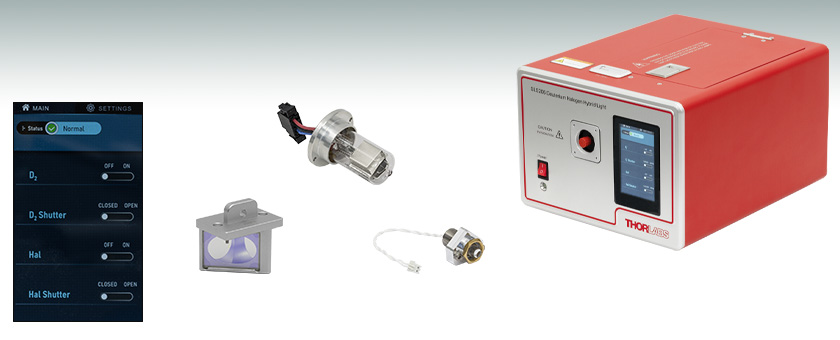
- Light Output Over 200 - 2000 nm Wavelength Range
- Dual Lamp Hybrid Design
- SMA905 Fiber-Coupled Output
- Compatible with SM1 Components and 30 mm Cage Systems
Touchscreen
Interface
SLS254B
Replacement
Deuterium Lamp
SLS251
Replacement
Halogen Lamp
SLS271
Replacement
Cold Mirror
SLS206
Broadband 200 - 2000 nm
Light Source

Please Wait
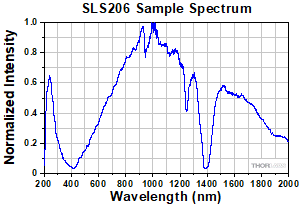
Click to Enlarge
Figure 1.1 The power spectral density for the SLS206 Light Source. Click here for raw data. Please note that due to detection limitations, data below 240 nm is theoretical and not measured.
Features
- Hybrid Light Source with Deuterium and Halogen Lamps for 200 - 2000 nm
- Stabilized Intensity Using Closed-Feedback Loop
- 0.02% Per Hour Output Power Drift
- SMA905 Fiber-Coupled Output with Dust Cover
- Internally SM1-Threaded (1.035"-40) Aperture
- Compatible with 30 mm Cage Systems and Ø1" Lens Tubes
- Ø1" Filter Holder Supports Optional Filters
- Replacement Lamp & Mirror Modules Available Separately
Thorlabs' SLS206 Hybrid Light Source provides stable illumination from 200 to 2000 nm. It combines a deuterium (D2) lamp with a tungsten-halogen lamp into a single beam path using a cold mirror to achieve this broadband output which is focused at a SMA905 bulkhead for connecting to the included M114L01 solarization-resistant fiber patch cable. The strong continuous spectrum at short UV wavelengths (200 - 400 nm) due to the deuterium lamp makes this an ideal source for UV spectroscopy applications. A tungsten-halogen lamp adds broadband blackbody emission through the visible and near-IR wavelengths. A closed-loop feedback system stabilizes the output power. Each lamp can be individually activated and a pair of shutters can block either beam path at up to 10 Hz. A low-noise fan cools the light source and lamps enabling continuous operation (see the Graphs tab for output stability over 70 hours of operation). Each SLS206 source includes a location-specific power cord.
The SLS206 source comes equipped with an SMA905 fiber adapter on the output aperture and a screw-on dust cap. The adapter can be removed to expose internal SM1 (1.035"-40) threading that is compatible with other externally SM1-threaded fiber adapters. The light source can also be used in free-space applications and has four 4-40 tapped holes for 30 mm cage rods that provide compatibility with 30 mm cage system components. Using the cage system, it is possible to incorporate various optic mounts that are centered along the optical axis of the lamp.
Within the light source housing is a deuterium lamp, halogen lamp, cold mirror for combining the beam paths, and a series of lenses to focus the emitted light on the fiber port. Within the deuterium lamp, an electric arc is generated that excites the gaseous deuterium causing molecular emission of a continuous UV spectrum. Within the halogen lamp, a tungsten element is heated so it emits blackbody radiation. The deuterium lamp used in the SLS206 has a lifetime of 2000 hours, the halogen lamp has a lifetime of 10 000 hours, and the cold mirror also has a 10 000 hour lifetime. Replacement lamp and mirror modules are available for purchase separately. Please see the Module Replacement tab for detailed instructions on how to replace these modules.
Please note that the SLS206 source generates high-intensity UV and NIR light. Wear appropriate eye protection and do not look directly at the output during operation. Do not place hands or body parts in the path of the beam.
| Item # | SLS206 |
|---|---|
| Wavelength Range | 200 - 2000 nm |
| Output Fiber | M114L01 Patch Cable (Included) Ø600 µm, 0.22 NA, SMA905 Connectors |
| Fiber-Coupled Output Power (Typ.)a | 0.1 mW (UV Region, 200 - 400 nm) 1.3 mW (200 - 2000 nm) |
| Free-Space Output Power (Typ.) | 1.8 mW (UV Region, 200 - 400 nm) 30 mW (200 - 2000 nm) |
| Output Power Driftb | 0.02% Per Hour (Typical) 0.1% Per °C (Typical) |
| Output Power Stabilityc | <0.01% |
| Module Lifetimed | Deuterium Lamp: 2000 Hours Halogen Lamp: 10 000 Hours UV Cold Mirror: 10 000 Hours |
| Shutter Switch Time | 5 ms |
| Shutter Repetition Rate (Max) | 1 Hz (Long Term) 10 Hz (Burst) |
| Power Supply | 100 - 240 VAC, 50 - 60 Hz, 90 VA max. |
| Operating Temperature | 10 to 30 °C |
| Storage Temperature | -15 to 70 °C |
| Dimensions (L x W x H) | 10.62" x 8.82" x 6.64" (269.8 mm x 224.0 mm x 168.6 mm) |
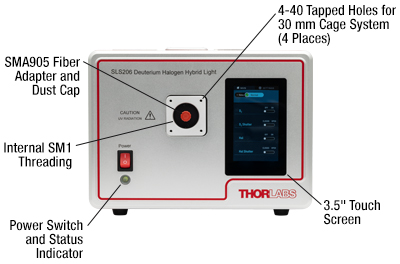
Click to Enlarge
Figure 2.1 Front Panel
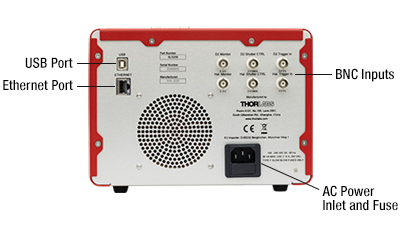
Click to Enlarge
Figure 2.2 Back Panel
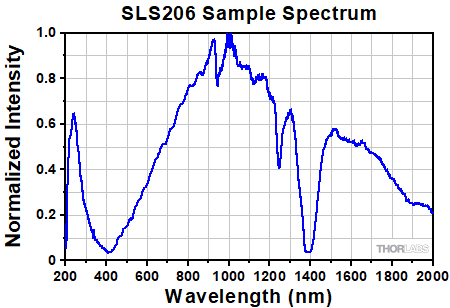
Click to Enlarge
The spectral power distribution for the SLS206 Light Source. Please note that due to detection limitations, data below 240 nm is theoretical and not measured.
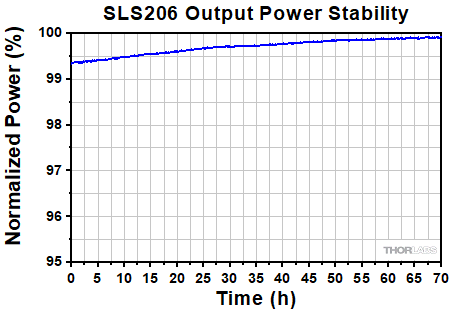
Click to Enlarge
The output power of the SLS206 over 70 hours of continuous operation. This graph does not include 45 minutes of warm-up to equilibrate the source and stabilize the output.
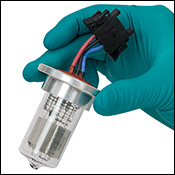
Click to Enlarge
Figure 4.1 The deuterium lamp can be held by the metal casing with gloved hands. Avoid making contact with the glass envelope directly.
Module Handling
The lamps used in this source operate at very high temperatures and optical coatings are sensitive to contamination. If handled incorrectly, these modules will become a serious hazard to users and could potentially cause severe injury. It is critical to follow safety instructions when handling them.
The guidelines below describe correct module handling.
- Any dust or grease on lamps or optics may compromise their integrity, increasing the chance that a component will fail, possibly exploding. Clean any dirt, oil, or lint away from the module with alcohol and a lint free cloth or tissue.
- Never bump, drop, apply excessive stress, or scratch the module. This could cause a lamp to burst.
- Always transport the module in the provided protective case or cover until installation.
- Save the protective case or cover and packaging materials (box) for modules that have been used to their rated service life.
- Always wear gloves when handling the module; never hold the module by the glass part (see Figure 4.1). Thorlabs offers gloves that can be used for handling.
- These lamps generate very high-intensity UV and NIR light output; wear the appropriate laser safety glasses during operation.
- Lamps gets very hot during operation. After operation, always wait at least 10 minutes for the source to cool down before handling modules.
- Electrostatic discharge (ESD) protection is recommended when handling these modules.
Module Installation
The instructions and photos below detail the recommended procedure for replacing the modules in the SLS206 Hybrid Light Source. Do not attempt to change these modules while the unit is hot. Allow at least 10 minutes after turning the source off before attempting to replace the modules.
We strongly recommend wearing gloves when replacing the modules to prevent skin oils from being deposited onto them. If you suspect a component is dirty, carefully clean it with alcohol before connecting the souce to a power supply.
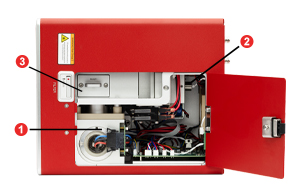
Click for Details
Figure 4.3 Installed Module Locations
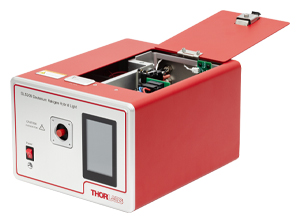
Click to Enlarge
Figure 4.2 Open Hatch to Access Modules
Deuterium Lamp Module
- Press the top latch in to access the internals, shown in Figure 4.2.
- Unplug the lamp module ('1' in Figure 4.3) and unscrew the two M3x0.5, 8 mm long cap screws on the module using a 2 mm hex key, then pull the lamp out.
- Perform the steps in reverse with the new module.
Tungsten-Halogen Lamp Module
- Press the top latch in to access the internals, shown in Figure 4.2.
- Unplug the lamp module ('2' in Figure 4.3) and unscrew the M3x0.5, 8 mm long setscrew on the module using a 2 mm hex key, then pull the module out.
- Perform the steps in reverse with the new module.
Cold Mirror Module
- Press the top latch in to access the internals, shown in Figure 4.2.
- Unscrew the two M3x0.5, 6 mm long cap screws on the module ('3' in Figure 4.3) using a 2 mm hex key, then pull the module out.
- Perform the steps in reverse with the new module.
Software for the SLS206 Hybrid Light Source
The SLS206 software allows the user to remotely activate the individual lamps, shutters, and BNC inputs via an easy-to-use GUI. The SLS206 light source connects to a PC through a USB interface. The software also includes C++, Python, and LabView SDKs, as well as a development manual for employing them.
| Posted Comments: | |
| No Comments Posted |
Below is a selection guide for all of our white-light, broadband, lamp-based light sources. In addition to these sources, Thorlabs also offers unmounted white-light LEDs, white-light mounted LEDs, white-light fiber-coupled LEDs, and high-powered, white-light Solis® LEDs.
| Broadband Light Source Selection Guide | ||||||||||
|---|---|---|---|---|---|---|---|---|---|---|
| Item # | (Click to Enlarge; Not to Scale) |
Emitter Type | Wavelength Range (Click for Plot) |
Output Coupling | Output Power | Lamp Electrical Power |
Color Temperature |
Lamp Lifetime |
Replacement Lamp |
|
| SLS204 | Deuterium | 200 - 700 nm | Free Space or Fiber Coupled (SMA) |
2 mWa 0.1 mWb (Typ.) |
30 W | N/A | 2000 hc | SLS254B | ||
| SLS206 | Deuterium & Quartz Tungsten-Halogen |
200 - 2000 nm | Free Space or Fiber Coupled (SMA) |
1.3 mWb (Typ.) |
De.: 30 W Hal.: 9 W |
N/A | 2000 hc 10 000 hc |
SLS254B SLS251 |
||
| SLS205 | Xenon Arc | 240 - 1200 nm | Free Space or Fiber Coupled (SMA) |
290 mWa 5 mWd (Typ.) |
75 W | 5800 Ka 5400 Kd |
2000 hc | SLS255B | ||
| SLS401 | Xenon Arc | 240 - 2400 nm | Free Spacee | >1.3 Wa | 150 W | 5800 K | 2000 hc | SLS401Bf or SLS402B |
||
| SLS402 | Mercury-Xenon Arc | 240 - 2400 nm | Free Spacee | >1.3 Wa | 150 W | 6000 K | 2000 hc | SLS401B or SLS402Bf |
||
| SLS302 | Quartz Tungsten-Halogen |
360 - 2500 nm | Free Spacee | >10 Wa | 150 W | 3400 K | 1000 hg | SLS301B | ||
| SLS201L(/M) | Quartz Tungsten-Halogen |
360 - 2600 nm | Free Spacee or Fiber Coupled (SMA) |
500 mWa 10 mWh |
9 W | 2796 K | 10 000 h | SLS251 | ||
| SLS301 | Quartz Tungsten-Halogen |
360 - 3800 nm | Free Spacee | >1.6 Wa | 150 W | 3400 K | 1000 hg | SLS301B | ||
| SLS603 | Xenon Arc | 380 - 780 nm | Ø3 mm Liquid Light Guide |
>7 Wh | 300 W | 6000 Ki | 1000 hc | SLS600B | ||
| SLS605 | Xenon Arc | 380 - 780 nm | Ø5 mm Liquid Light Guide |
>15 Wh | 300 W | 6000 Ki | 1000 hc | SLS600B | ||
| OSL2 | Tungsten-Halogen | 400 - 1600 nm (Typical) |
Fiber Bundle | 1.4 Wk | 150 W | 3200 K | 1000 hc | OSL2Bf, OSL2B2, or OSL2BIR |
||
| OSL2IR | Tungsten-Halogen | 400 - 1750 nm (Typical) |
Fiber Bundle | 3.8 Wk | 150 W | 3200 K | 200 hc | OSL2B, OSL2B2, or OSL2BIRf |
||
| QTH10(/M) | Quartz Tungsten-Halogen |
400 - 2200 nm | Free Space | 50 mW (Typ.) | 10 W | 2800 Kl (Typ.) | 2000 h | QTH10B | ||
| SLS203F(/M) | Silicon Carbide Globar | 500 nm - 9 µm | Free Spacee or Fiber Coupled (SMA) |
1.8 Wa | 24 W | 1500 K | 10 000 h | SLS253 | ||
| SLS303 | Silicon Nitride Globar | 550 nm - 15 µm | Free Space | 4.5 Wa | 70 W | 1200 K | 5000 hg | SLS303B | ||

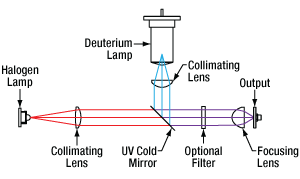
Click to Enlarge
Figure G1.1 The SLS206 contains two collimating lenses and a focusing lens to couple two lamp outputs into a fiber.
- 200 - 2000 nm Stabilized Light Source
- 1.3 mW Coupled Power Through Included M114L01 Patch Cable
- Location-Specific Power Cord Included
- Replacement Lamp & Mirror Modules Sold Below
Thorlabs' Stabilized Hybrid Deuterium and Tungsten-Halogen Light Source provides a constant-power, 1.3 mW broadband spectrum between 200 and 2000 nm. Since the output light spans UV, visible, and near-infrared spectral ranges, this source is ideal for use in spectroscopic measurements. An integrated filter holder supports optional ∅1" filters up to 3.5 mm thick.
The coupled output power of the SLS206 source with the included multimode M114L01 solarization-resistant fiber patch cable is 1.3 mW. Patch cables with smaller core sizes and numerical apertures or longer fibers can be used at the expense of the output power while a larger core size or shorter fiber length can increase the output power. The SMA905 fiber adapter on the front of this light source is removable and can be replaced with any internally SM1-threaded fiber adapter. In particular, to provide compatibility with LLGs, the SM1T1 coupler can be used with a liquid light guide (LLG) collimation adapter. Transmission of wavelengths longer than 800 nm through the LLG for longer than an hour may result in permanent damage to the LLG tip; to reduce damage during extended use, incorporate a filter to limit transmission of IR wavelengths.
Take care when removing and reinserting the fiber adapter, as it is pre-adjusted to its optimum position during manufacturing. Free-space applications are supported if a patch cable is not used at the output port.

- SLS254B: Replacement Deuterium Lamp Module (2000 Hour Lifetime)
- SLS251: Replacement Tungsten-Halogen Lamp Module (10 000 Hour Lifetime)
- SLS271: Replacement UV Cold Mirror Module (10 000 Hour Lifetime)
These modules are replacements for the SLS206 stabilized hybrid light source. Please see the Module Replacement tab for detailed instructions. Be sure to install the correct module in the correct location, as modules are not interchangeable.
Note: We strongly recommend wearing gloves when replacing modules in any of our stabilized light sources to prevent skin oils from being deposited onto the module. If you suspect the module is dirty, carefully clean it with alcohol before connecting the source to a power supply.
 Products Home
Products Home




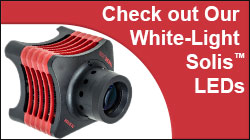
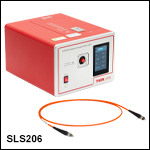
 Zoom
Zoom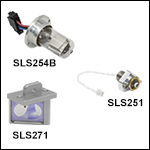
 Stabilized Deuterium & Tungsten Light Source
Stabilized Deuterium & Tungsten Light Source